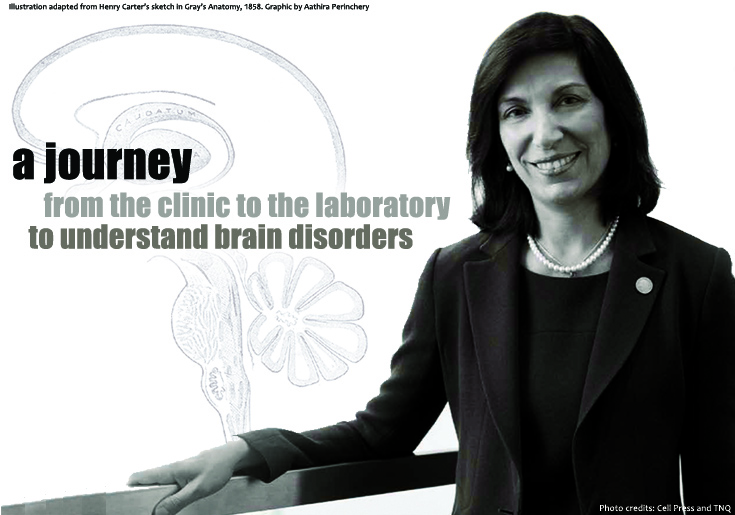Renowned neuroscientist Huda Zoghbi visits NCBS
Eminent neuroscientist Huda Zoghbi visited the National Centre for Biological Sciences (NCBS) today. On campus, she interacted with students, post-doctoral fellows and faculty of the NCBS and InStem. Zoghbi is in town to deliver a talk at the Indian Institute of Science, organized as part of the Cell Press-TNQ India Distinguished Lectureship Series 2014. Her lecture A Journey from the Clinic to the Laboratory to Understand Brain Disorders, which will be delivered in the cities of Chennai and New Delhi as well is dedicated to NCBS founder and renowned scientist late Obaid Siddiqi. "Very appropriately, Zoghbi spoke about her work on connecting neurological disease phenotypes like the Rett syndrome with genetic mutations at this lecture given in memory of Obaid. Obaid's pioneering research on the behavioural genetics of the fruit fly opened up the field of exploring the genetics of complex behavioral traits," says Satyajit Mayor, Director of NCBS. Zoghbi presented her work on the genetic and molecular mechanisms of neurodevelopmental and neurodegenerative disorders such as the Rett syndrome and Alzheimer's and Parkinson's diseases. She also discussed the implications of her findings in developing treatments for such disorders.
As a resident paediatrician, it was Zoghbi's interactions with Rett syndrome patients that spurred her on to study molecular genetics and take up research to understand the disease better. In 1988 she set up her laboratory in the Baylor College of Medicine (Texas, USA) to study such neurodevelopmental and neurodegenerative diseases. Beginning with spinocerebellar ataxias (a family of brain disorders that are caused by a degeneration of the spinal cord and the cerebellum) Zoghbi's work in collaboration with Harry Orr in 1993 led to the discovery of the genetic mutation that caused the disease. The discovery paved the way to better understand the role of protein aggregation in neurodegenerative diseases.
Six years later, Zoghbi and her colleagues discovered yet another genetic mutation, one that caused the disease she had first set out to study - the Rett syndrome. This rare neurological disorder affects the grey matter of the brain, interfering with cognitive, sensory, emotional and motor functions. The disease is characterized among others, by stereotyped hand movements and the deceleration of head development in infants, mostly girls.
The same year Zoghbi and her team discovered the Math1 gene. They found that Math1 is critical to the formation of a variety of cells - from inner ear hair cells to intestinal secretory cells and even granular neurons (nerve cells in the cerebellum) that govern motor skills. Later, her team also determined that faulty Math1 genes result in the production of excessive granular neurons which culminate in the common childhood tumour, medulloblastoma.
Subsequently, all of Zoghbi's work has had enormous implications in medical research and treatment. A lot of this work involved studying mice in the laboratory - but while most scientists are content with results alone, Zoghbi returned to clinics regularly to look for the symptoms that her mouse models predicted in humans. This dedication together with quality research brought to Zoghbi innumerous awards and honors including the Vilcek Prize in Biomedical Research (2009) and the Gruber Prize in Neuroscience (2011). The latest include the Dickson Prize in Medicine and the Pearl Meister Greengard Prize in 2013. Zoghbi is currently a professor in the departments of Pediatrics, Molecular and Human Genetics, Neurology and Neuroscience at the Baylor College of Medicine. She is also an investigator at the Howard Hughes Medical Institute and the director of the Jan and Dan Duncan Neurological Research Institute at the Texas Children's Hospital.
This year, Zoghbi is the Featured Speaker in the Cell Press-TNQ India Distinguished Lectureship Series. As part of the series, Emilie Marcus Editor-in-Chief of Cell also gave a talk on "Publishing and Ethics" at the NCBS. Sponsored by Cell Press (an imprint of Elsevier) and TNQ Books and Journals, the series aims to fuel interactions between Indian scientists and other eminent scientists from across the world.
True to the spirit of the series, NCBS and InStem faculty got to interact with Zoghbi. "She was very interested in understanding the entire landscape of biological research in India and how it is organized in the country," says Mayor.
Zoghbi's interactive session at NCBS today with students and post-doctoral fellows stole the show. The session was a centre of a myriad questions and discussions. What struck Giselle Fernandes, a research scholar in PI Sumantra Chattarji's laboratory at NCBS, was the philosophy that the eminent scientist iterated throughout the discussion. "She said that age and wisdom often gravitate towards more common and safe experiments; and while direction is important for science, some of her major discoveries have come from work where she has either taken a risk or been forced to take a risk by her students. So she encouraged us to enjoy every phase of a scientist's life - the naive youth and the wise aged," says Fernandes. When asked how she balances being a mother and an investigator, Zoghbi had a ready response: a co-operative spouse, a structured work life, prioritising her children during her free time and delegating all essential house-hold tasks to hired hands. "She gave a fantastic and inspiring perspective of being a woman in science and pursuing research as a career," says Satyajit Mayor who was also present during the discussions.
Junior scholar Saptarnab Naskar also found the session extremely inspiring. "Focus! Don't get into too many things in the beginning. Pursue few things but do it well, with depth." Zoghbi's zest is sure to motivate many budding scientists.

Comments
Post new comment